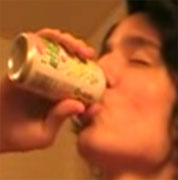
MONDAY, Sept. 27 (HealthDay News) — There is a popular misconception that because sports drinks and other noncarbonated beverages are associated with physical activity they must be healthy, University of Texas researchers report.
In a study of more than 15,000 middle and high school students throughout Texas, researchers found that kids who drank sugar-sweetened beverages, including sports drinks, were more likely than kids who didn’t to eat unhealthy foods and watch more TV than those who did not. However, students who drank sports beverages were more likely than soda drinkers to exercise and consume fruits, vegetables and milk — suggesting they viewed sports drinks as healthy.
“Adolescents and their parents need to be educated that consumption of large amounts of flavored and sports beverages is not consistent with a healthy lifestyle,” said lead researcher Nalini Ranjit, an assistant professor of health promotion and behavioral sciences at the Michael & Susan Dell Center for Healthy Living at the University of Texas School of Public Health in Austin.
“Adolescents who engage in an otherwise reasonably healthy lifestyle with lots of physical activity and a healthy diet still consume large amounts of sugar-sweetened beverages in the form of flavored and sports beverages,” she added. “We believe that this is due to successful marketing that has led consumers to see these beverages as healthy.”
The report is published in the Sept. 27 online edition of Pediatrics.
For the study, Ranjit’s team collected data on 15,283 middle and high school students throughout Texas. Of these students, 22 percent of the boys and 17 percent of the girls were obese.
Although regular soda consumption has been linked to weight gain, the researchers found that 83 percent of boys and 78 percent of girls had consumed one or more sugar-sweetened beverages the previous day, and 28 percent reported drinking three or more sodas or sports drinks a day.
The researchers looked at consumption of sodas and noncarbonated flavored and sports beverages and their association with eating unhealthy foods like sugary desserts, fried meats and fried snacks like chips and French fries. They also looked at how these drinks were associated with consumption of healthy foods like vegetables, fruit and milk.
In addition, they examined the association of these drinks with physical activity and participation in sports and also with sedentary activities, such as watching TV, using the computer and playing video games.
In this study of 8th and 11th grade students in Texas, drinking sugar-sweetened beverages is associated with unhealthy diet and physical activity behaviors like consuming fried meats and chips, Ranjit said. Kids who drank sugar-sweetened beverages, including sports drinks, were more likely to engage in sedentary behaviors like watching TV, using the computer and playing video games. Those who drank soda were also less likely to participate in organized sports, school PE or vigorous physical activity, and to drink less milk and eat less fruits and vegetables than those who did not.
“However, the most interesting finding was that students who drink flavored and sports beverages such as punch, Koolaid and Gatorade are also more likely to engage in higher levels of physical activity as well as consume fruits, vegetables and milk. This association was not seen with children who drink regular soda,” she said.
Samantha Heller, a dietitian, nutritionist, exercise physiologist and clinical nutrition coordinator at the Center for Cancer Care at Griffin Hospital, in Derby, Conn., commented that “there is confusion among kids and adults as to when consuming sweetened beverages is appropriate.”
“Sports drinks, for example, are important for young athletes who are training or competing at intense levels or exercising in the heat. But drinking sports drinks and other sweetened drinks at the computer or with lunch just adds nonnutritive calories and can pack on pounds,” she added.
Nonetheless, these drinks are marketed as healthy alternatives to soda, Heller said.
“Some have added vitamins, antioxidants or herbs and the front label shouts out claims that this drink can boost the immune system, increase metabolism or fight disease,” she said. “It is understandable that people are drinking them in place of soda and water believing they are healthy. For most of us, most of the time, plain water is the best way to maintain hydration.”
More information
For more information on healthful diet, visit the U.S. Department of Agriculture .

